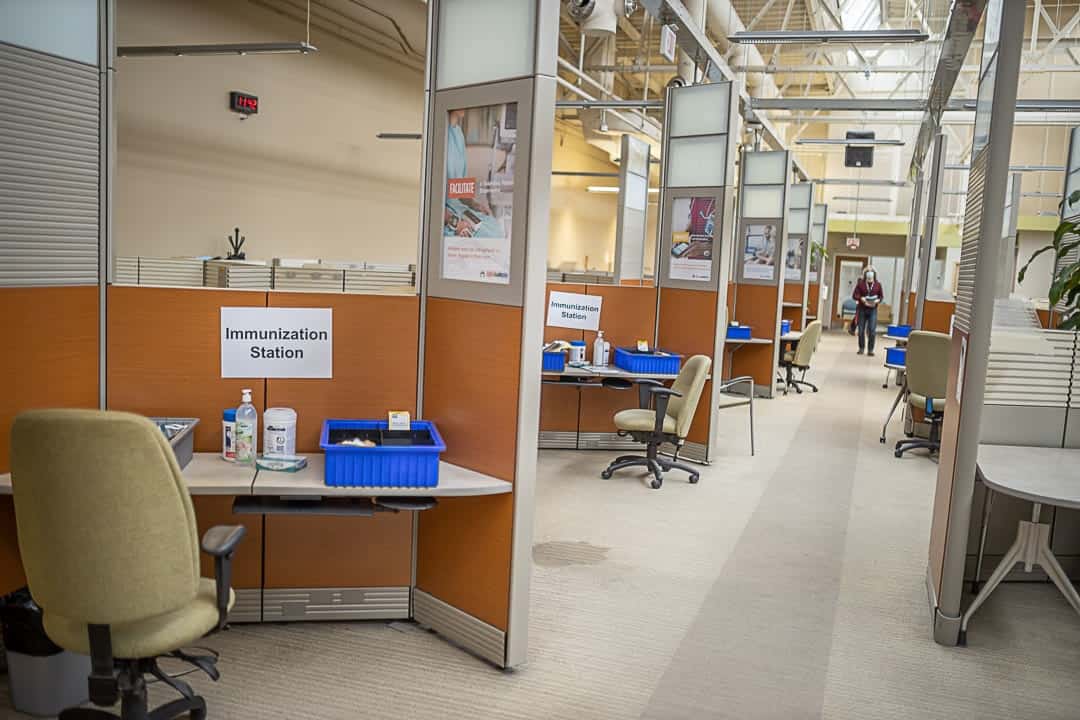Hamilton’s McMaster research team developing COVID-19 vaccine that can be inhaled
Published March 10, 2021 at 3:02 pm

Two new second-generation COVID-19 vaccines are being rapidly tested at McMaster University in Hamilton, one of which is designed to be inhaled rather than injected.
It’s the first vaccine in Canada being developed that would deliver COVID-19 vaccines by inhalation through the mouth.
The 30-member team of investigators and researchers is led by Zhou Xing, a professor in the department of medicine and McMaster Immunology Research Centre.
He is also an expert on respiratory mucosal immunity, infectious diseases, and tuberculosis vaccine development.
In an interview with McMaster University’s communications manager, Michelle Donovan, Xing said his team was able to move quickly on their COVID-19 vaccine research because the foundation had already been laid.
“We have been pursuing tuberculosis mucosal immunity research,” said Xing. “…that line of work has been ongoing for the past 20 years. That tells you, conventionally, how long that journey has been compared to work on the COVID-19 vaccine.”
“We have built up a very strong ‘bench-to-human’ translational pipeline, which is where our strength lies. So we could easily apply all the knowledge, experiences and expertise to developing COVID-19 vaccines strategies,” continued Xing.
“We were ready to jump in as soon as we received our [Canadian Institutes of Health Research] funding in June 2020.”
 (McMaster Faculty of Health Sciences)
(McMaster Faculty of Health Sciences)
The McMaster research team refers to it as a “second” or “next-generation” COVID-19 vaccine strategy because it differs from the current-market vaccines in that it was bioengineered to express three select SARS-CoV-2 antigens.
The current front-running vaccines target only one, the spike protein.
The major difference is that the McMaster vaccine will be delivered via the respiratory mucosal route, rather than being injected into the muscle through the skin.
“We believe our vaccines will engage what we call an all-around, or holistic protective mucosal immunity,” Xing told Michelle Donovan. “We aim to release or induce the broadest possible protective immunity, right at the site of viral entry. The different vaccine design and different route of administration lead to what we believe to be much better protective immunity.”
The vaccines being worked on by Xing’s team aren’t only a boost in the fight against COVID-19.
The team believes their vaccines will also help fight the growing list of variants and future viruses, as well.
“All the current-generation vaccines are being given to the masses, and that is where we think our vaccine strategies come into play, working as immunity boosters,” said Xing.
“It works by not only boosting the immune response to the early vaccine shots but by inducing a new layer of immune protection mediated by broadened T cell immunity. Thus, it will help fight the current and the next pandemics caused by coronaviruses. That is how we envision it will play out.”
Xing leads McMaster’s efforts alongside Brian Lichty, an associate professor in the department of medicine and director of the Robert E. Fitzhenry Vector Laboratory; Fiona Smaill, professor of pathology & molecular medicine; Matthew Miller, associate professor of biochemistry & biomedical sciences; and a large team of experts, who are part of Canada’s Global Nexus for Pandemics and Biological Threats.
insauga's Editorial Standards and Policies advertising





